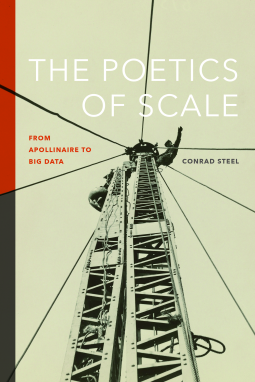
The Poetics of Scale
From Apollinaire to Big Data
by Conrad Steel
This title was previously available on NetGalley and is now archived.
Send NetGalley books directly to your Kindle or Kindle app
1
To read on a Kindle or Kindle app, please add kindle@netgalley.com as an approved email address to receive files in your Amazon account. Click here for step-by-step instructions.
2
Also find your Kindle email address within your Amazon account, and enter it here.
Pub Date Feb 19 2024 | Archive Date Feb 19 2024
University of Iowa Press | University Of Iowa Press
Talking about this book? Use #ThePoeticsofScale #NetGalley. More hashtag tips!
Description
LITERARY CRITICISM / SCHOLARLY
Since the start of the twentieth century, poets have been irresistibly drawn to the image of the poem as a kind of data-handling, a way of mediating between the divergent scales of aesthetics and infrastructure, language and technology. Conrad Steel shows how the history of poetry—with its particular formal affordances, and the particular hopes and fears we invest it with—has always been bound with our changing logistics of macroscale representation. This history takes us back to the years before the First World War in Paris, where the poet Guillaume Apollinaire claimed to have invented a new mode of poetry large enough to take on the challenges of the coming twentieth century.
The Poetics of Scale follows Apollinaire’s ideas across the Atlantic and examines how and why his work became such a vital source of inspiration for American poets through the era of intensive American economic expansion and up to the present day. Threading together Apollinaire’s work in the 1910s with three of his American successors—Louis Zukofsky in the 1930s, Allen Ginsberg in the 1950s, and Alice Notley from the 1970s onward—it shows how poetry as a cultural technique became the crucial test case for the scale of our collective imagination.
Advance Praise
“Steel makes a compelling case for Guillaume Apollinaire’s far-reaching impact on a century’s worth of U.S. poetry. This highly original and historically rigorous book traces the migration of Apollinaire’s influence stateside. Persuasively argued and elegantly written, The Poetics of Scale offers an invaluable contribution to the study of American poetry and poetics.”—Stephen Voyce, author, Poetic Community: Avant-Garde Activism and Cold War Culture
“A sophisticated, colorful exploration of the reception of Apollinaire’s poetry in the United States. Steel tracks the complex shifts and perplexities involved in the attraction to Apollinaire’s intimate, fluent modernism with its fusion of charismatic I-voice and choral voicing, its paratactic form, and socially conscious, affect-inflected acoustics of radical ambience.”—Adam Piette, University of Sheffield
Available Editions
| EDITION | Other Format |
| ISBN | 9781609389314 |
| PRICE | $92.50 (USD) |
| PAGES | 316 |
Links
Available on NetGalley
Featured Reviews
 Anne M, Reviewer
Anne M, Reviewer
This is a very academic book and not an easy read. It has scores of pages of footnotes and references and I’ll be following up on quite a few of them I think. This is the kind of book that opens doors. It makes you want to explore deeper into the poets mentioned, the rise of modernism, the influences that artists acknowledge and those they might not even be aware of. I knew of Guillaume Apollinaire but hadn’t read much of his work. Writing before the First World War, he believed his poetry was big enough to write the 20th century. Coming after him, many agreed.
I love the poetry of Allen Ginsberg who was writing in the 1950s, although I’m no expert. But if Ginsberg rates Apollinaire then I’m going to listen. This book also introduced me to Louis Zukofsky writing in the 1930s, and Alice Notley writing from the 1970s onward. Zukovsky especially sounded like a fascinating man. I’ve bought several books because of reading this one and I’m looking forward to educating myself further on American poetry and the synthesis of imagination across the years.
Recommended if you’re interested in poetry, poetics and modernism in particular.
I was given a copy of the book by NetGalley



